The following people at the telescopes listed have agreed to participate, at varying levels, in this AGN monitoring program.
| Waveband | Contact Person | Telescope |
| Radio | Margo F. Aller (UMRAO) | UMRAO |
| Anne Lahteenmaki | Metsahovi | |
| Infra Red | Josh Bloom (Berkeley) | PAIRITEL |
| Optical | Paul Boltwood | Boltwood |
| Jim Buckley & Vicky Kuen Lee | Antipodal | |
| Patrick Charlot | Bordeaux | |
| Mike Carini | 0.6m, Bell Observatory | |
| Omar Kurtanidze & Maria Nikolashvili | 70cm & 125cm, Abastumani Observatory | |
| Chuck Pullen | Coyote Hill Observatory | |
| Juan Antonio Ros | Sbadell | |
| Alberto C. Sadun | New Mexico Skies Observatories | |
| Aimo Sillanpaa | Tuorla | |
| Gino Tosti | Perugia | |
| Trevor Weekes | FLWO 48-inch | |
| T. Montaruli | WIYN 0.9m |
UTDate: The UT Date on which the observations were taken with the Whipple 10m telescope.
Rate (Crab): The gamma-ray rate (in Crabs) detected from this target. If gamma-rays were not detected above the 1 sigma level, an upper limit is quoted, again in Crabs. The peak detection threshold for the 10m telescope is estimated to be approximately 350 GeV.
Rate Error (Crab): The error on the reported gamma-ray rate in Crab units.
Duration (Hours): The duration, in hours, of the gamma-ray on-source observation at the Whipple 10m.
UTC Start: The time, in UTC, at which the Whipple observations started.
Click on the name of the AGN to access the most recent data: NOTE: March 2008 -Lightcurve-updating has been abandoned temporarily. Watch this space: Lightcurves will be back online soon.
The Whipple collaboration pioneered the Imaging Atmospheric Cherenkov Technique (IACT) for the detection of Very High Energy (VHE) gamma rays. The Whipple 10 m gamma-ray telescope was located at the Fred Lawrence Whipple Observatory in Southern Arizona in the United States. The predecessor to VERITAS (Very Energetic Radiation Imaging Telescope Array System), this telescope was in operation from 1968 until its decommissioning in 2013, and detected the first TeV gamma-ray source, the Crab Nebula in 1989 (Weekes et al., 1989).
The Davies-Cotton reflector held 248 hexagonal mirrors and provided a total reflecting area of 75 m^2. The camera was located at the focal point and (ultimately) contained 379 PhotoMultiplier Tubes (PMTs) with a field of view of ~2.6 degrees and an angular resolution of 0.117 degrees. The telescope operated between 300 GeV and 10 TeV.
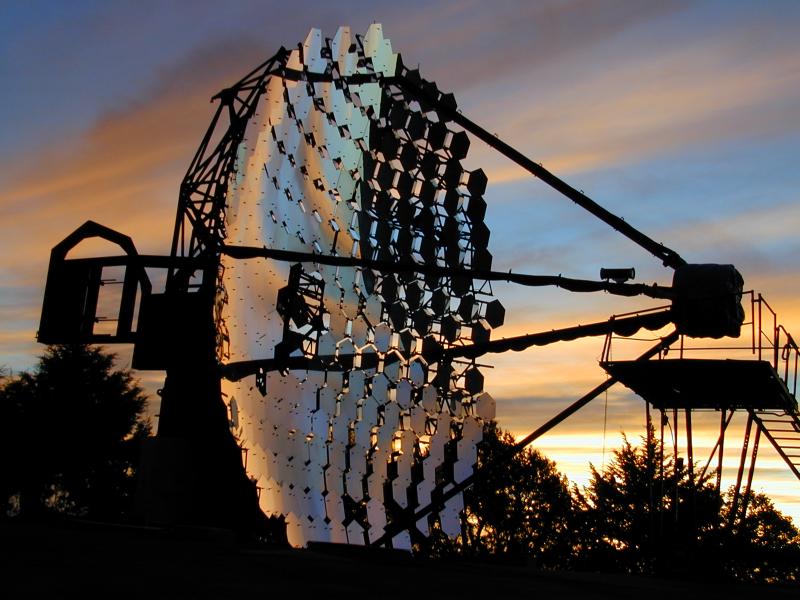
The primary emphasis of the collaboration's research effort was the search for and study of gamma ray sources in the energy range of 100 GeV - 10 TeV. Since the mid-2000's, the telescope's primarily concern was long term blazar monitoring in the search for interesting or increased activity and it also acted as an alert system for the VERITAS array. For the observing season 2010/11 a number of known TeV blazars including the High frequency BL Lacs (HBLs) Mrk421, 1ES2344+514, 1ES1959+650 and 1ES0229+200 were observed and the nightly lightcurves are posted below.
Blazar Lightcurves
Markarian 421.
Mrk 421 the closest known TeV blazar located at a redshift of z=0.031, was the first extragalactic source detected at TeV energies by a ground-based instrument in 1992 (Punch et al 1992). This HBL is one of the most active TeV blazars and exhibits extreme variability, on the timescale of hours. Mrk 421 has been monitored closely and studied extensively since its discovery
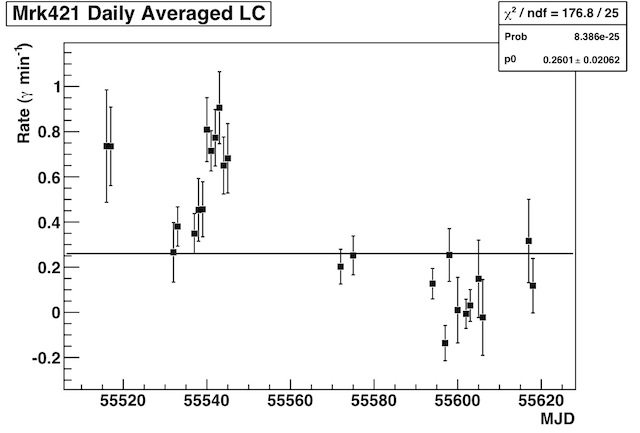
1ES0229+200
1ES0229+200 is a HBL at a distance of z=0.14. Due to its unusualy hard TeV spectrum it is an excellent candidate for Extragalactic Background Light (EBL) studies
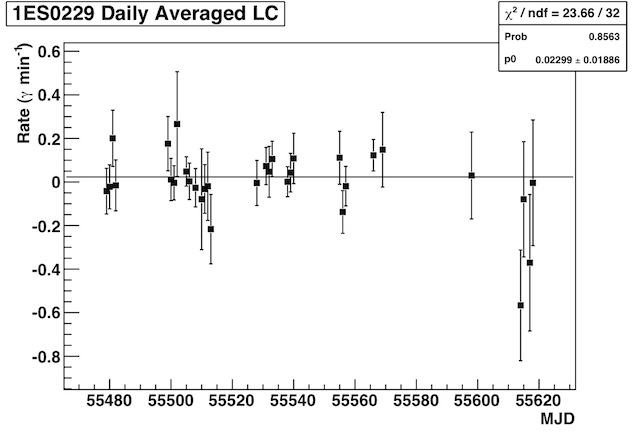
1ES1959+650
1ES1959 (HBL, z=0.047) was first discovered as a TeV gamma-ray emitter in 1998 by the Seven Telescope Array [Nishiyamma T et al., 1998]. In 2002, the Whipple 10m detected flaring activity from 1ES1959 up to 5 times the Crab Nebula flux [Holder et al, 2003]
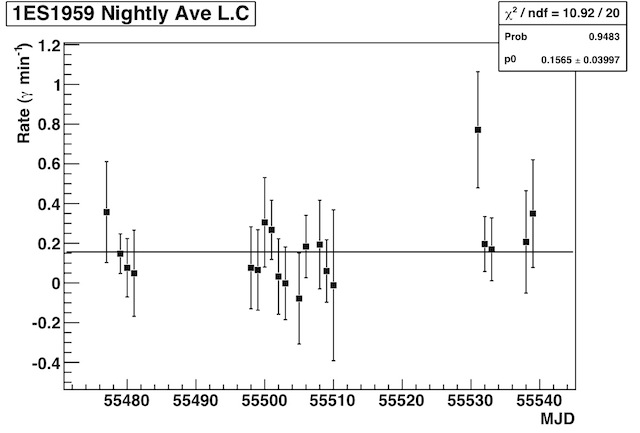
1ES2344+514
1ES2344 is a HBL at a redshift of z=0.044. The Whipple Collaboration reported a weak signal from the source between 1999-2001.
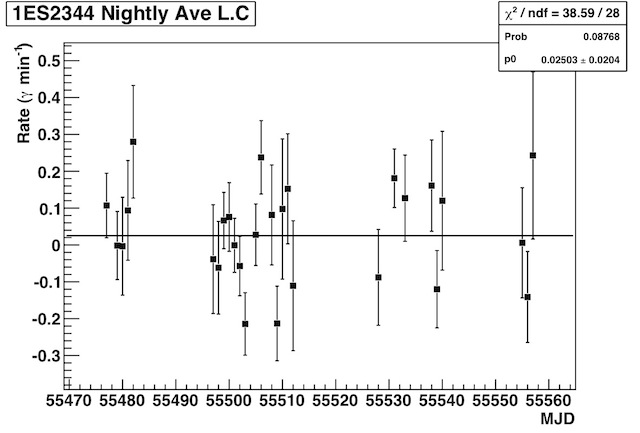
- 1ES2344+514 : October 2007 - January 2008;
- 1ES1959+650 : October 2007 - December 2007; April 2008 - June 2008
- Markarian 421 : December 2007 - June 2008
- H1426+428 : January 2008 - June 2008
- Markarian 501 : March 2008 - June 2008

